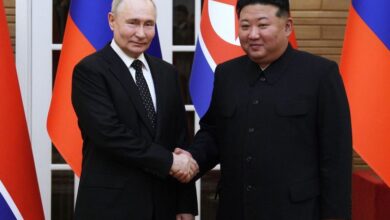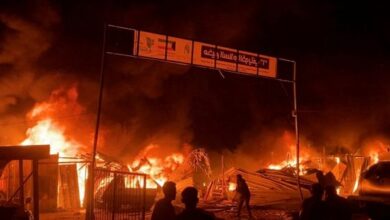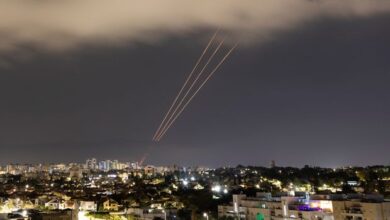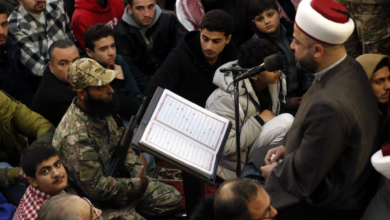Israeli Strikes Hit Iran’s Nuclear and Military Targets, Revolutionary Guard Chief Reported Killed
Israeli strikes killed Iran’s Revolutionary Guard chief and hit nuclear sites, escalating tensions between the two countries.
TEHRAN, Iran (WE) — In a dramatic escalation of Middle East tensions, Israel launched coordinated airstrikes on Iran early Friday, targeting its nuclear and military infrastructure. Among those killed was Gen. Hossein Salami, the powerful head of Iran’s Islamic Revolutionary Guard Corps, according to Iranian state media.
Shortly after the strikes, a somber news anchor on Iranian state television confirmed that Gen. Hossein Salami had died. “We confirm the assassination and martyrdom of Gen. Hossein Salami,” the anchor announced, without providing further details.
Iranian authorities have yet to release an official casualty count. However, preliminary reports indicate that the attack also killed two senior nuclear scientists and a high-ranking Revolutionary Guard commander. Analysts describe the deaths as Iran’s most significant military loss since the 1980–88 war with Iraq.
At the same time, Israeli Prime Minister Benjamin Netanyahu addressed the nation, explaining that the operation aimed to eliminate an imminent threat from Iran’s nuclear and missile programs. In a YouTube video, he pledged that Israel would continue the strikes “for as many days as it takes to remove this threat.”
The assault came one day after the International Atomic Energy Agency (IAEA) censured Iran for refusing access to key nuclear sites. In retaliation, Iran had announced the creation of a third uranium enrichment site and vowed to upgrade its centrifuge technology. That move heightened regional fears that Tehran was closer than ever to acquiring a nuclear weapon.
In light of these developments, Israel moved quickly. Its intelligence agencies reportedly assessed that Iranian facilities were within weeks of producing weapons-grade uranium.
As a result, Israel launched a series of precision strikes in and around Tehran, with fighter jets, drones, and cyber tools reportedly involved. Notably, this marks the first time Israel has openly acknowledged such a broad-scale attack inside Iran.
According to Netanyahu, the strikes focused on three key areas: nuclear research and enrichment facilities, command centers within the Islamic Revolutionary Guard Corps, and stockpiles related to Iran’s ballistic missile program.
Israel Defense Forces (IDF) Defense Minister Israel Katz later confirmed Israel’s role. “We carried out a necessary operation to protect our people and future generations,” he said. He also warned that Iran would likely launch missile and drone attacks against Israel and its civilian population immediately.
In anticipation, Katz signed an emergency order activating Israel’s Home Front Command. “Citizens must follow instructions and remain in protected areas,” he emphasized.
As both Iran and Israel quickly shut down their airspace, panic spread across major Iranian cities. Sirens echoed in Isfahan and Mashhad. Residents rushed into shelters and began stockpiling food and fuel.
At the same time, massive crowds gathered in Azadi Square in central Tehran to mourn Salami’s death. Many waved Iranian flags and chanted anti-Israel slogans, accusing Tel Aviv of committing war crimes. The Iranian government declared a national day of mourning and announced plans for a state funeral.
Beyond Iran, the ripple effects of the strike were felt immediately. In Lebanon, the militant group Hezbollah placed its fighters on high alert. Shortly afterward, rockets were fired into northern Israel, prompting retaliatory artillery strikes. Meanwhile, in Gaza, Hamas praised the Iranian leadership and called the Israeli action “an open declaration of war.”
Read More:
- One Survivor Reported as Air India Plane Crash in Ahmedabad Kills 240
- US Moves to Evacuate Embassy Staff Amid Rising Middle East Tensions, Signals Hard Line Against Iran’s Nuclear Ambitions
- South Africa Flood Disaster: Death Toll Rises to 49 as Eastern Cape Battles Worst Weather in Years
Despite the widespread regional fallout, the Trump administration in Washington emphasized that it played no role in the operation. “We are not involved in strikes against Iran,” said Secretary of State Marco Rubio in an official statement. “Our top priority is protecting American personnel and interests across the region.”
Furthermore, Rubio noted that Israel had informed the U.S. in advance, framing the mission as an act of self-defense. At the same time, U.S. Central Command (CENTCOM) began repositioning assets and evacuating non-essential personnel from Baghdad and Erbil. The Pentagon also offered voluntary departures for families of service members stationed in Qatar, Bahrain, and Kuwait.
As oil prices surged nearly 5%, markets reacted sharply to the potential for a wider regional war. Benchmark Brent crude rose to $92 per barrel as investors worried about supply disruptions through the Strait of Hormuz.
In the hours following the attack, global leaders scrambled to contain the fallout. French President Emmanuel Macron urged both nations to “step back from the brink of war.” Germany’s Foreign Ministry also released a statement calling for de-escalation.
In contrast, Russia and China sharply condemned Israel. During an emergency United Nations Security Council session, Russian envoy Vasily Nebenzya accused Israel of acting “recklessly and without regard for international law.” China echoed these concerns, warning of a “catastrophic confrontation.”
In Tehran, Ayatollah Ali Khamenei remained silent publicly but issued a statement through his office. He condemned the attack as “an act of terrorism” and vowed “a harsh and unforgettable response.”
Meanwhile, analysts say the death of Gen. Salami could leave a strategic gap in Iran’s security apparatus. “This is not just a symbolic loss,” said Dr. Narges Tabari, a Middle East specialist at Georgetown University. “Salami was a key strategist in Iran’s military and foreign policy, especially in Syria and Iraq. His absence creates both vulnerability and unpredictability.”
Looking ahead, military experts predict Tehran may avoid direct war but could retaliate through proxies. This includes threats to Israeli embassies, attacks on commercial shipping in the Gulf, or cyber operations targeting Israeli infrastructure.
Already, Iranian-backed militias in Iraq have launched rocket fire near U.S. bases. In Yemen, Houthi forces threatened to resume long-range missile attacks on Saudi oil fields, which would further complicate the situation.
Despite the rising risks, Netanyahu insists that Israel is prepared for any scenario. “We will not be deterred,” he said. “No nation has the right to threaten the Jewish people with annihilation.”
For now, the world watches anxiously. The next 48 hours may determine whether the Middle East spirals into another devastating conflict — or whether backchannel diplomacy can prevent war.















